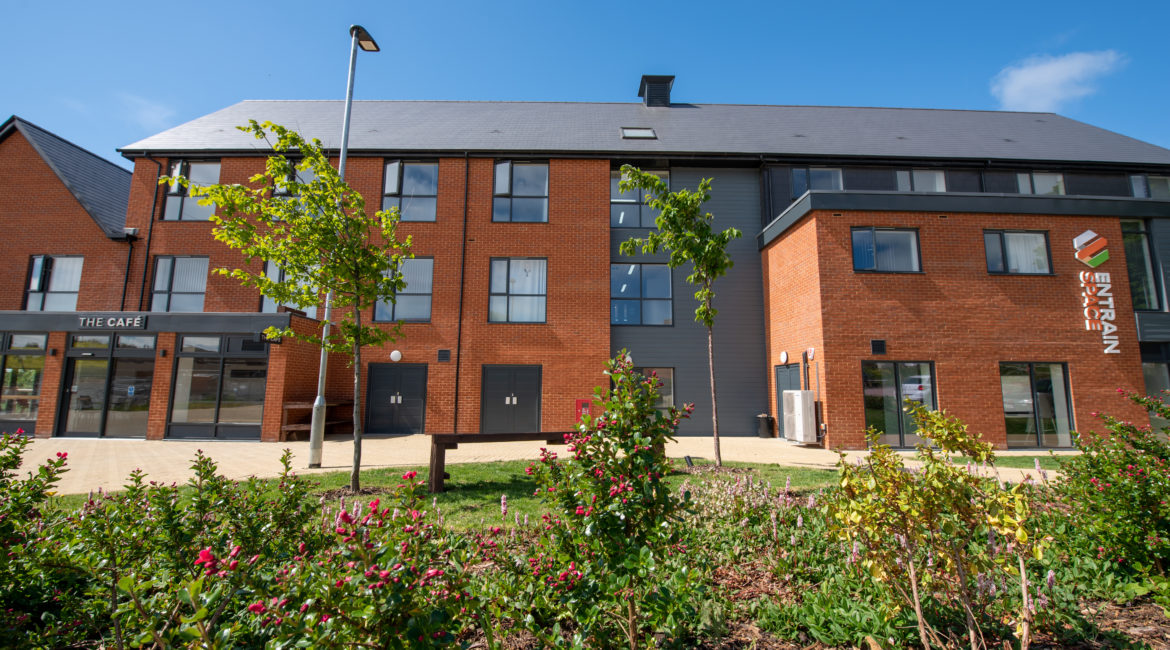Despite the difficulties of the long winter Covid lockdown, we have carried on as best we could with our core mission – to provide veterans and Service-leavers in need with homes, welfare support, training and employment opportunities. Here’s a snapshot of how we coped.
Community kindness
A positive connection with the local community is vital for true resilience. Sadly, the community events and activities we hoped to have were impossible over the past year, but the value of community support was demonstrated at Christmas, when generous local donations of festive fare, decorations and gifts added real cheer and warmth at what was for some a very difficult time.
Entrain Space’s team leader, Head of Operations Neil Griffith, said: “I really think it made a difference for our residents because they were grateful for it… And that cake manufacturer in town dropping off all those Christmas cakes they had – that perked everyone up!”
Keep carrying on
Our on-site training suite was designed to put work and training at the heart of our operations. These facilities have helped us to continue with our pr ogram of training in a limited way, using the space and computer terminals. The superfast broadband connection donated by Openreach in 2019 has helped hugely. We moved all our interviews for places at Entrain Space online too, which meant we could continue to meet housing needs.
ogram of training in a limited way, using the space and computer terminals. The superfast broadband connection donated by Openreach in 2019 has helped hugely. We moved all our interviews for places at Entrain Space online too, which meant we could continue to meet housing needs.
Doing things ‘virtually’ hasn’t been easy. For example, training remotely makes it harder to build a working rapport. Damon Saddler from Alert Training UK, the training provider at Entrain Space said:
“it’s much easier to sit down together face-to-face over a cup of coffee and work out what your strengths and weaknesses are, what transferable skills you have from the military, what your aspirations and the opportunities are.”
Groupwork interactions are also tricky online, and Damon is looking forward to being able to visit the training suite again in person to make the most of these facilities.
One positive of online training has been that it has forced residents into using technology that was previously a barrier to them. This has highlighted a new funding need for access to personal IT equipment such as laptops.
Mental health challenges
Unsurprisingly a lack of face-to-face contact has proved particularly challenging for the mental health of residents, especially this time over winter. Neil Griffith, said:
“For residents with pre-existing mental health issues such as PTSD, anxiety and depression, we have seen these heightened.”
As essential workers, the team have remained on site at the Entrain Space office to provide support. “Being onsite means we can knock on doors and check on people. And I think for residents, just knowing they can come in and have a (covid secure) chat helps.”
Part-time jobs have been a lifeline for some residents, including those within Entrain Space’s own social enterprises. One such resident, Karl, an Army Air Corps veteran, works for the Entrain Space Maintenance social enterprise. Karl said:
“That’s been a godsend to be honest. It’s given me something to do. It’s nice to get a little bit of routine, a little bit of structure. Because if I haven’t got routine or structure I don’t know whether I’m coming or going.”
Karl continued: “I’ve lived the military life all my life, I’ve spent 15 years in Germany, my dad was in the Army, so even as a dependent of somebody in the Army, everything is very structured for you. When I got out of the Army that had all gone so it was all a bit of a shock really.
“It has been hard for everyone, I know, but I struggle anyway so it makes it doubly as hard,” but the maintenance work has been “one of the biggest things that’s helped.”
We are proud of the resilience shown at Entrain Space through this tough time, and we are all looking forward to emerging from lockdown when we can hopefully get out there and start to have some real interactions, improve our wellbeing and get on with life!
Share this story:

